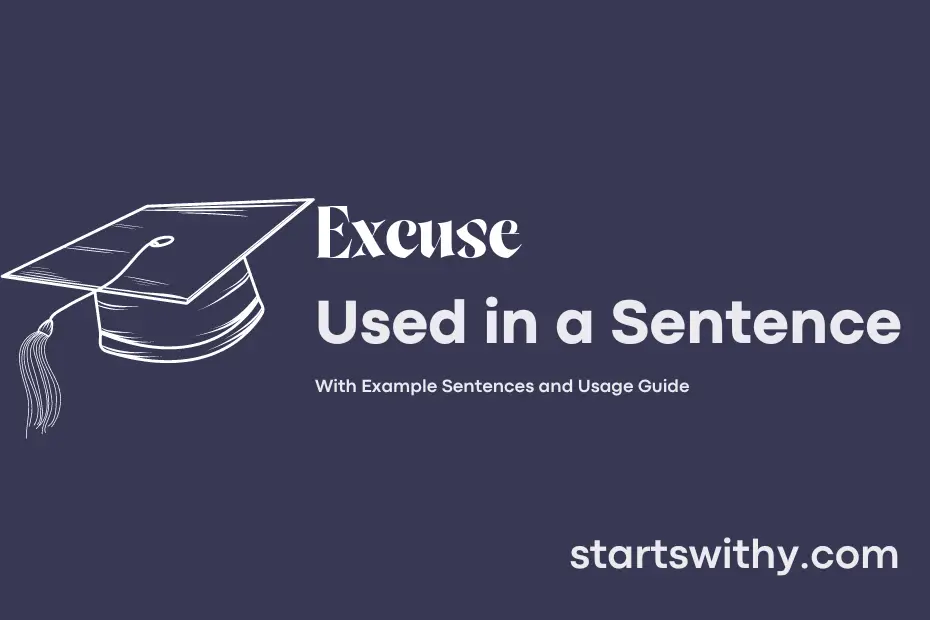Do you sometimes find yourself in need of a valid justification for an action or behavior? That’s where the concept of an “excuse” comes into play. An excuse is an explanation or reason given to justify or defend a situation, action, or behavior.
It is common for individuals to use excuses in various scenarios, whether to explain a missed deadline, justify a mistake, or avoid taking responsibility for their actions. Excuses can range from acceptable and genuine reasons to poor attempts at shifting blame onto others. In essence, excuses serve as a way for individuals to rationalize their behavior or choices.
7 Examples Of Excuse Used In a Sentence For Kids
- Please excuse me, may I borrow a pencil?
- Excuse me, can I help you find your book?
- Excuse me, may I have a turn on the swing?
- Sorry, excuse me for bumping into you.
- Excuse me, can I have a glass of water, please?
- Excuse me, may I sit next to you at lunch?
- Excuse me, can you help me tie my shoelaces?
14 Sentences with Excuse Examples
- Excuse me, can I borrow your notes for the lecture?
- I have a valid excuse for missing the presentation- my internet stopped working.
- Excuse the messy handwriting in my assignment, I was in a rush to finish it.
- Can I use the printer? I have an excuse that it’s urgent and I can’t find any printing shops nearby.
- I have a doctor’s excuse for missing the exam, can I reschedule it?
- I need an excuse to leave the class early, can you text me something urgent?
- Excuse me, can you share your lunch with me? I forgot to bring mine today.
- I’m running late because of traffic, can you please tell the professor my excuse for not being on time?
- I have a family emergency as an excuse for not submitting my assignment on time.
- Excuse me, can I borrow a pencil for the exam?
- I couldn’t finish the group project on time due to personal reasons, do you think the professor will accept that as a valid excuse?
- I have an excuse for not attending the college fest, I had a family function to attend.
- Can you come up with a good excuse for me not completing the project?
- I need a convincing excuse to skip the boring seminar tomorrow, any suggestions?
How To Use Excuse in Sentences?
To use the word Excuse in a sentence, follow these simple steps:
-
Identify the situation: Determine the context in which you want to use the word Excuse. It could be an apology, a reason for being late, or a justification for an action.
-
Understand the meaning: Excuse can be used as a noun or a verb. As a noun, it refers to a reason or explanation given to justify a fault or offense. As a verb, it means to forgive, overlook, or justify.
-
Construct your sentence: Begin your sentence with the word Excuse when using it as a noun. For example, “I have a valid excuse for missing the meeting.” When using it as a verb, place it accordingly in the sentence. For instance, “Please excuse my behavior at the party last night.”
-
Add more context: To provide further clarification, you can include additional information in your sentence. For example, “Can you excuse my absence from work last week as I was unwell?”
-
Practice: To get comfortable using the word Excuse, practice using it in different sentences and contexts. This will help you become more confident in incorporating it into your everyday language.
By following these steps and practicing regularly, you will quickly become adept at using the word Excuse correctly in your sentences.
Conclusion
In conclusion, making excuses is a common behavior that people use to avoid taking responsibility for their actions or decisions. Excuses are often crafted to shift blame, rationalize failures, or minimize personal accountability. By recognizing when we are making excuses and taking ownership of our choices, we can cultivate a more honest and accountable mindset. It is important to be mindful of the impact that excuses can have on relationships, self-esteem, and overall personal growth. Instead of making excuses, it is more beneficial to acknowledge mistakes, learn from them, and strive to make positive changes moving forward. By adopting a mindset of accountability and taking ownership of our actions, we can cultivate integrity, resilience, and personal development.



